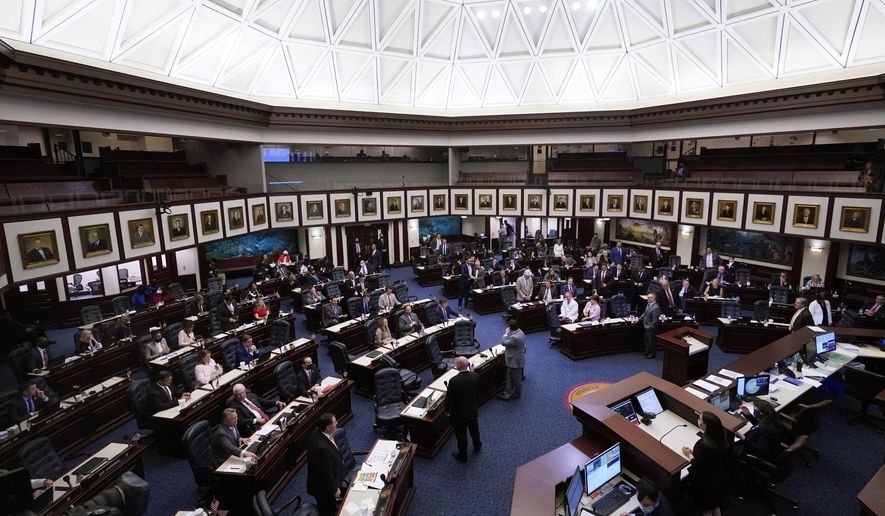Conservative lawmakers in states across the country have introduced almost 200 bills since early last year that would restrict discussions about race and gender in school, according to a free speech advocacy group.
Generally, the legislation would prohibit in-class discussions about critical race theory, which posits that systemic racism exists in U.S. institutions, and about gender and sexual issues, especially among the youngest students.
More than 175 bills have been filed in 40 states since January 2021, with 103 pending in the current state legislative sessions. Fifteen of the bills have become law in 13 states, according to New York-based PEN America, which says the legislation seeks to enforce “compulsory patriotism” by censoring “anti-American” ideas.
“Unfortunately, educational gag orders substitute a fragile pseudo-patriotism for the real thing,” Jeremy C. Young, PEN America senior manager for free expression and education, said in an email. “Hiding facts and ideas from children, making it illegal to answer students’ questions in the classroom or to explain the world around them, is no way to instill a love of country.”
The most high-profile of the new laws is Florida’s parental rights legislation, which critics have named the “Don’t Say Gay” bill. It prohibits public school teachers in kindergarten through third grade from teaching any lessons related to “sexual orientation or gender identity.”
The LGBT advocacy groups Equality Florida, Family Equality and the National Center for Lesbian Rights filed a lawsuit in Tallahassee against the bill three days after Republican Gov. Ron DeSantis signed it into law. Opponents say it stifles free classroom discussion.
Daniel J. Mahoney, a senior fellow at the nonpartisan Real Clear Foundation, said critics get the state measures “almost completely backward.”
“They are essentially defensive actions responding to the massive introduction of heavy-handed ideological approaches to racial, sexual, and historical matters in American schools across the country,” said Mr. Mahoney, a former political science professor at Assumption University in Worcester, Massachusetts.
Of the 103 bills still viable in state legislatures, 97 would cover K-12 schools, 42 address higher education and 57 include punishments for violators.
The legislative prohibitions have divided academics and parental rights advocates.
Jonathan Zimmerman, a professor in the history of education at the University of Pennsylvania, called them “fundamentally un-American” attacks on “freedom of speech and open dialogue in our classrooms.”
“I hope all freedom-loving Americans will rise up to protest them,” Mr. Zimmerman said.
James Grossman, executive director of the American Historical Association, said the bills prevent history teachers from “including academically legitimate subjects” touching on race and gender issues that students need to understand the roots of current political divisions.
“It is impossible to heal divisions by denying their existence,” Mr. Grossman said. “It is imperative that we understand the origins and evolution of these divisions, even if sometimes it makes us uncomfortable.”
However, Robert Weissberg, a retired professor of political science at the University of Illinois, said he finds opposition to the bills ironic.
“Let me say that it was not long ago when the left was outraged over religious conservatives attempting to insert creationism into the school curriculum,” Mr. Weissberg said.
And Robert Heineman, a political science professor at Alfred University in western New York, said the bills reflect the conviction of parents that teachers have no right to contradict the values they give their children.
“State-funded and -directed school systems in this nation have no historical, political, constitutional or moral right to deny parental hegemony at the family level, and that fact is now coming to the forefront of American policy,” Mr. Heineman said.
Parental rights advocates have denied that the bills limit teachers’ academic freedom to discuss controversial topics, especially in elementary schools.
“The subjects that are being limited are not age-appropriate and should be left to the parents’ discretion as to how and when to teach such sensitive information,” said Kimberly Fletcher, founder of the advocacy group Moms for America.
Topics that parental rights advocates have deemed inappropriate for young children include “gender fluidity,” the notion that a child’s male or female identity and expressions might change over time.
Paul J. Batura, vice president of communications for the Christian conservative group Focus on the Family, said the bills reclaim authority for parents from lesson plans that have increasingly included such ideas.
“We applaud legislation that protects the freedom of parents to determine how and when their children should be taught about delicate and complex issues,” Mr. Batura said.
In addition to Florida’s new law, Mississippi now forbids public K-12 and higher education institutions from directing students to embrace specific theories about sex, race, ethnicity, religion or national origin. It also forbids any “distinction or classification” of students based on race.
In South Dakota, a new law forbids public colleges and universities from requiring students or employees to “attend or participate in any training or orientation that teaches, advocates, acts upon, or promotes divisive concepts.” The law does not specify “divisive concepts.”
The PEN America report said Tennessee, Kentucky, Wisconsin, Georgia, Arizona and Alabama are considering similar legislation that may become law soon.
Conservatives said they look forward to more of the bills becoming law.
“Branding these reforms — in reaction to extreme types of pedagogy that did not even exist a few years ago — as ‘censorship’ or ‘repression’ is transparently agenda-driven,” said attorney Mark Pulliam, a contributing editor at Law & Liberty magazine.
Added Matthew Spalding, dean of Hillsdale College’s graduate school of government in the District of Columbia: “Who gave these teachers a right to teach children whatever they want about sex, or to encourage them to look at each other according to the color of their skin?”
• Sean Salai can be reached at ssalai@washingtontimes.com.




Please read our comment policy before commenting.